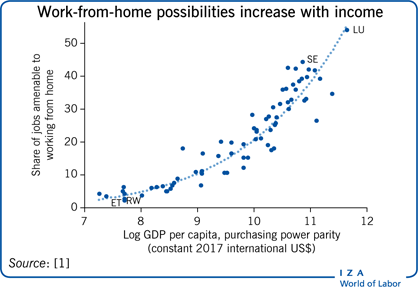Elevator pitch
Work-from-home possibilities are lower in developing than in developed countries. Within countries, not all workers have equal chances of transitioning from the usual workplace to work-from-home. Moreover, infrastructure limitations and lack of access to certain services can limit the chances of effectively working from home. Having a home-based job can affect, positively or negatively, work–life balance, levels of job satisfaction and stress, and productivity. The differential chances of working from home may end up increasing the levels of income inequality between workers who can and those who cannot work from home.
Key findings
Pros
Working from home can improve workers’ work–life balance through reduced work–family conflict, increased control over the timing of work, or reduced commuting time, according to evidence from developed countries.
Job satisfaction can increase due to working from home, in certain contexts.
In certain occupations, productivity can increase while working from home, for instance, because of the convenience of being at home and its relative quiet.
Cons
Low-educated and low-paid workers have lower possibilities of working from home than high-educated and high-paid workers.
Infrastructure and services constraints negatively affect the chances of working from home, especially in developing countries.
In the longer-term, productivity may decline when working from home due to the loss of information and knowledge spillovers that would normally occur between workers when interacting face-to-face.
The differential chances of working from home may result in income inequality increases between workers who can and cannot work from home.
